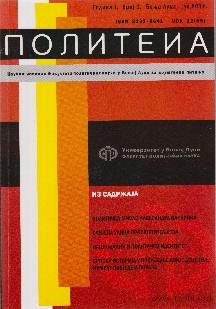Cultural and Ideological Roots of the U.S. Policy in the Balkans
Cultural and Ideological Roots of the U.S. Policy in the Balkans
Author(s): Srđa TrifkovićSubject(s): Diplomatic history, Political history, International relations/trade, Transformation Period (1990 - 2010), Political Essay, Geopolitics
Published by: Fakultet političkih nauka Univerziteta u Banjoj Luci
Keywords: Balkans; United States of America; U.S. foreign policy; U.S. Balkan policy; Bosnia and Herzegovina; civil war;
Summary/Abstract: Over the past two decades the decision-makers in Washington and in the major capitals of Western Europe have acquired a bias in Balkan affairs which goes beyond any single piece of policy and falls outside the parameters of rational debate. As Doug Bandow of the Cato Institute has noted, such policy is not as inconsistent as it seems: “time after time the U.S. policy makers would ask what is it that the Serbs want, think about it for about five seconds, and reply that it is totally unacceptable.” Such consistency has had grim results. In Serbia the NATO powers carried out a premeditated aggression in the last year of the last century. Their mendacity, as displayed at Rambouillet in February 1999, was on par with Munich 1938. In Kosovo they engineered a violent secession by an ethnic minority which will render many European borders tentative. In Bosnia-Herzegovina they helped ignite the war in the spring of 1992, notably with U.S. Ambassador Warren Zimmermann’s now notorious mission to Sarajevo. [...]
Journal: Politeia - Naučni časopis Fakulteta političkih nauka u Banjoj Luci za društvena pitanja
- Issue Year: 1/2011
- Issue No: 1
- Page Range: 163-172
- Page Count: 10
- Language: English

